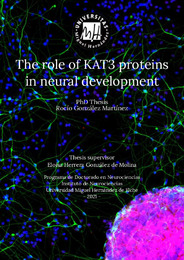Por favor, use este identificador para citar o enlazar este ítem:
https://hdl.handle.net/11000/29212Registro completo de metadatos
| Campo DC | Valor | Lengua/Idioma |
|---|---|---|
| dc.contributor.advisor | HERRERA, ELOISA | - |
| dc.contributor.author | González Martínez, Rocío | - |
| dc.contributor.other | Instituto de Neurociencias | es_ES |
| dc.date.accessioned | 2023-04-28T09:15:29Z | - |
| dc.date.available | 2023-04-28T09:15:29Z | - |
| dc.date.created | 2022-05-06 | - |
| dc.identifier.ismn | 1735 | - |
| dc.identifier.uri | https://hdl.handle.net/11000/29212 | - |
| dc.description.abstract | Rubinstein-Taybi syndrome (RSTS) is a genetic neurodevelopmental disorder characterized by mental impairment and a wide spectrum of congenital abnormalities, that is caused by hemizygous mutations in the KAT3 proteins CBP and P300. The precise function of KAT3 proteins during the development of the central nervous system has not been clearly stated. Here, throughout a combination of in vitro and in vivo approaches we dissect the functions of CBP and P300 in different steps of neural development. We first demonstrate in vitro that proliferation of neural progenitors is not affected in the absence of CBP or P300 but is seriously compromised when both proteins are absent simultaneuosly. In addition, elimination of either CBP or P300 impedes neuronal and glial differentiation although they are not individually required to preserve neuronal identity. Removal of CBP, p300 or both in retinal progenitors or postmitotic retinal ganglion cells confirm these results in vivo and demonstrate that CBP plays a more prominent role than P300 during retinal differentiation. These data contribute to a better understanding on the individual roles of KAT3 proteins in neural differentiation and may help on the prevention and treatment of RSTS patients. | es_ES |
| dc.format | application/pdf | es_ES |
| dc.format.extent | 198 | es_ES |
| dc.language.iso | eng | es_ES |
| dc.publisher | Universidad Miguel Hernández de Elche | es_ES |
| dc.rights | info:eu-repo/semantics/openAccess | es_ES |
| dc.rights.uri | http://creativecommons.org/licenses/by-nc-nd/4.0/ | * |
| dc.subject | Neurobiología | es_ES |
| dc.subject | Biología molecular | es_ES |
| dc.subject.other | CDU::6 - Ciencias aplicadas::61 - Medicina::616 - Patología. Medicina clínica. Oncología::616.8 - Neurología. Neuropatología. Sistema nervioso | es_ES |
| dc.title | The role of KAT3 proteins in neural development | es_ES |
| dc.type | info:eu-repo/semantics/doctoralThesis | es_ES |
| dc.contributor.institute | Institutos de la UMH::Instituto de Neurociencias | es_ES |

Ver/Abrir:
Tesis Rocio Gonzalez Martinez_2_compressed.pdf
2,33 MB
Adobe PDF
Compartir:
 La licencia se describe como: Atribución-NonComercial-NoDerivada 4.0 Internacional.
La licencia se describe como: Atribución-NonComercial-NoDerivada 4.0 Internacional.
.png)